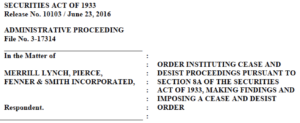Types Of SEC Cases: Misleading Offering Materials
SEC Fines Merrill Lynch $10 Million For Misleading Offering Materials
The SEC fined Merrill Lynch, Pierce, Fenner & Smith Incorporated (“Merrill Lynch”) $10 million for providing retail investors with misleading offering materials.Misleading Offering Materials Failed To Disclose Certain Fees
In its Order, the SEC accused Merrill Lynch of distributing misleading offering materials that failed to sufficiently disclose specific fixed costs in a proprietary volatility index linked to Strategic Return Notes (the “Notes”) of Bank of America Corporation. The offering was sold to approximately 4,000 retail investor accounts in 2010 and 2011 and raised roughly $150 million.
The SEC Order
This case demonstrates the SECʼs ongoing commitment to creating a level playing field when it comes to the sale of highly complex financial products to retail investors.

The SEC’s press release
Lack Of Policies And Procedures
As a wholly-owned subsidiary of Bank of America, Merrill Lynch was the principal agent responsible for the creation, editing, and final approval of the offering materials on Bank of America’s behalf. The SEC determined that Merrill Lynch failed to implement appropriate policies or procedures to verify that the offering materials had sufficient disclosures pertaining to the material effect the Execution Factor would have on the costs of the Notes. According to the SEC, that failure contributed to the misleading offering materials:“This case continues our focus on disclosures relating to retail investments in structured notes and other complex financial products. Offering materials for such products must be accurate and complete, and firms must implement systems and policies to ensure investors receive all material facts,” said the Director of the SEC Enforcement Division.
Settlement and Penalty
Merrill Lynch agreed to cease and desist from committing or causing any similar future violations and to pay a penalty of $10 million to the SEC.Whistleblowers Can Report Misleading Offering Materials To The SEC
This case illustrates some types of misconduct that could give rise to SEC whistleblower cases if reported to the Commission through the SEC whistleblower program. However, the SEC has not made any public statement as to whether this case was itself an actual SEC whistleblower case. The SEC Office of the Whistleblower posts Notices of Covered Action (“NoCA”) for Commission actions where a final judgment or order results in monetary sanctions exceeding $1 million. The NoCA list does not disclose if a particular Enforcement action was brought as the result of an SEC whistleblower case, tip, complaint, or referral being filed with the Commission.Additional Information
For more information about misleading offering materials, click on the links below:- The SEC’s Press Release announcing the settlement. (External link to the SEC’s website.)
- The SEC’s Order in SEC v. Merrill Lynch. (External link to the SEC’s website.)







